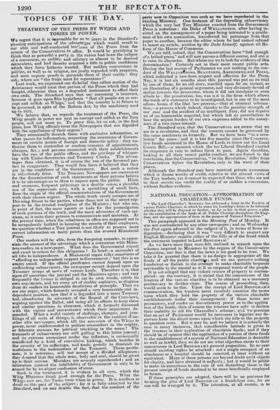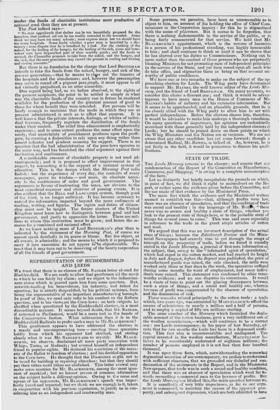NATIONAL EDUCATION—APPROPRIATION OF CHARITABLE FUNDS.
" The Lord Chancellor's Secretary has addressed a letter to the Trustees of various Public Charities, in which he states his Lordship's desire to be informed whether they will be disposed to further, so far as lies in their power, a plan for the consolidation of, the funds of all Public Charities throughout the king- dom, and the appropriation of them to the purpose of National Education."
This paragraph appeared in the Morning Post of Monday. It was not contradicted by any other newspaper ; and on Wednesday the Post again adverted to the subject of it, in terms of fierce in- dignation,—declaring that it was " very difficult to suspect any English Minister capable either of the folly or of the fraud which the statement imputed to Lord BROUGHAM."
As we have more than once felt. inclined to remark upon the
schemes imputed to. Ministers by the organs of the Conservative Opposition, our fear is that the news is too good to be true. 'We take it fur granted that there is no design to appropriate all the funds of all the public charitiv ; and we can perceive nothing fraudulent or foolish in the attempt to make charitable bequests serviceable to the mental as w, It as corporeal wants of the people.
It is not alleged that any violent seizure of property is contem-
plated : on the contrary, it is stated that the concurrence of the trustees of the various charities is to be obtained as a necessary preliminary to further steps. The course of proceeding, then, would seem to be this. Upon the receipt. of Lord BROUGHAM'S communication, the trustees must carefully examine the terms upon which they hold the property of the various charitable establishments under their management : if those terms are peremptory, and confer no discretionary power as to the applica tion of the funds, then of course the trustees have only to declare their inability to aid the Chancellor's scheme ; and we presume that an act of Parliament would be necessasy to legalize any de- parture from the direct terms upon which the title to the property in question rests. But it may be, and we believe it is actually the case in many instances, that considerable latitude is given to the trustees in their application of charitable funds; and if they should be of opinion that the application of a portion of these funds to the establishment of a system of National Education is desirable as well as lawful, then we do not see what objection exists to their concurrence in Lord BROUGHAM'S general proposition. In no case should existing rights be attacked : not a single occupant of an almshouse or a hospital should be removed, at least without an equivalent. Many of these persons are beyond doubt unfit objects for charity, and have obtained it unjlistly ; but it would be politic to make no exceptions to the rule of not disturbing those in the present receipt of funds destined to be more beneficially employed in future.
If these principles are adopted, there will be no pretence for terming the plan of' Lord BROUGHAM a fraudulent one, for no one will be wronged by it. The intention, at all events, is to , • tender the funds of . charitable institutions more productive of national good than they are at present.
The Post indeed says- " No man apprehends that shelter can be too bountifully, prepared for the kouseless, that medical aid can be too readily extended to the wounded. Some think we may have too many schools ; none express alarm lest we should have too many hospitals. Some doubt whether a poor man is benefited by a dic- tionary ; none dispute that he is benefited by a loaf. For the clothing of the naked, for the feeding of the hungry, for the healing of the sick, pious and belie- Nolent men have bequeathed part of their worldly goods; and the funds so ersated, the Chancellor proposes to take from the naked, and the hungry, and the sick. that the next generation may exceed the present in reading and writing and casting accounts." But there is no foundation for the charge that Lord BROUGHAM intends to take the funds from the naked, hungry, and sick of the present generation,—that he means to clqiar out the inmates of the hospitals and the almshouses; and, however the presumption may serve to round off a piquant paragraph, it must appear to all not eiolently prejudiced, as an utter absurdity. Due regard being had, as we before observed, to the rights of the present recipients, the point to be settled is simply in what way the charitable funds of the country can in future be rendered available for the production of the greatest amount of good to those for whose benefit they were intended. Few persons will be hardy enough to maintain that the mode in which they are at present administered is such as to effect that purpose. It is well known that the private interests, feelings, or whims of indivi- dual trustees, frequently regulate the distribution of the funds under their control. The relief thus administered is emphatically capricious ; and to some extent produces the same effect upon the needy, that uncertainty of punishment produces upon the profli- gate, by creating a disposition to rely upon any thing rather than honest industry and prudent economy for support. There is no question that the bad administration of the poor-laws operates in the same way, and has furnished the chief argument against their institution and continuance.
A considerable amount of charitable property is not used ad- vantageously; and it is proposed to effect improvement in this respect, by converting it to the support of a national system of education. This is the design which the Morning Post calls foolish : but the experience of every day, the contents of every newspaper, prove its wisdom—and more, its absolute neces- sity to the continuance of order and good government. The arguments in favour of instructing the mass, are obvious to the most superficial reasoner and observer of passing events. It is also evident that the BELL and LANCASTER system, though good of the kind, is no longer sufficient. It has become necessary to extend the information imparted beyond the mere rudiments of reading, writing, and figures. The rights and duties of citizen- ship must now be taught. The future electors of the United Kingdom must learn how to distinguish between good and bad government, and justly to appreciate the latter. There are mil- lions to whom this instruction must be given; and hence the oc- casion for a-combined and national effort.
As we know nothing more of Lord BROUGHAM'S plan than is indicated by the statement of the Morning Post, of course we cannot speak decidedly in its praise or blame. But the object, at all events, is admirable; and the means by which it is proposed to carry it into execution do not appear to'be objectionable. We trust that it may turn out to be deserving of the hearty cooperation of all the friends of good government.



















 Previous page
Previous page